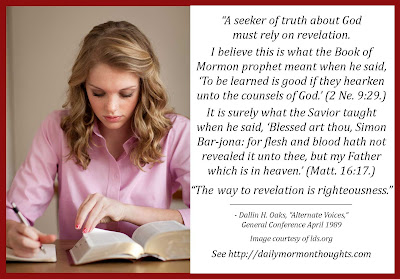"The greatest blessings of general conference come to us after the conference is over. Remember the pattern recorded frequently in scripture: we gather to hear the words of the Lord, and we return to our homes to live them....
"We accept the Savior's invitation when we ponder and pray to understand what we have been taught and then go forward and do His will. Remember President Spencer W. Kimball's words: 'I have made up my mind that when I go home from this [general] conference ... there are many, many areas in my life that I can perfect. I have made a mental list of them, and I expect to go to work as soon as we get through.' President Monson recently said: 'I encourage you to read the talks... and to ponder the messages contained therein. I have found in my own life that I gain even more from these inspired sermons when I study them in greater depth.'
"In addition to inviting us to hold personal and family scripture study, Heavenly Father wants us to regularly study and apply what we have learned in conference. I testify that those who put their trust in the Lord and heed this counsel in faith will gain great strength to bless themselves and their families for generations to come."
- Robert D. Hales, "Strengthening Faith and Testimony," General Conference October 2013
Click here to read the full talk
At least part of the key comes in the encouragement we are frequently given to read the talks (they are available online almost immediately, and in print very soon) and ponder the messages. There is more to be gained as we continue to "regularly study and apply what we have learned in conference"!
(Compilation and commentary by David Kenison, Orem, Utah, 2022)
October 4, 2015
October 4, 2015






























